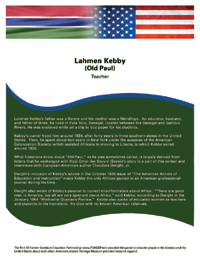
Lahmen Kebby
(Old Paul)
Kebby's owner freed him around 1834, after forty years in three southern states in the United States. He spent about two years in New York under the auspices of the American Colonization Society, which assisted Africans in moving to Liberia, to which Kebby sailed around 1836.
What historians know about “Old Paul,” as he was sometimes called, is largely derived from letters that he exchanged with Hajji Omar ibn Sayyid (Sayyid’s story is a part of this series) and interviews with European-American author Theodore Dwight, Jr. Dwight’s inclusion of Kebby’s advice in the October 1835 issue of “The American Annals of Education and Instruction” made Kebby the only African quoted in an American professional journal during his time.
Dwight also wrote of Kebby’s passion to correct misinformation about Africa. “There are good men in America, but all are very ignorant about Africa,” said Kebby, according to Dwight in the January 1864 “Methodist Quarterly Review.” Kebby also spoke of educated women as teachers and students in his homeland. He died with no known American relatives.
.gif)







